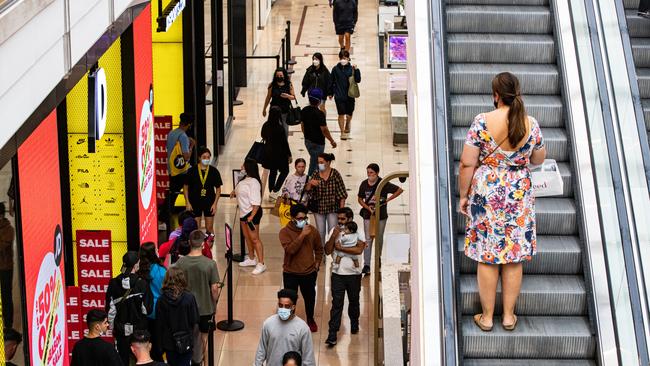Australian Retailers Association calls for budget tax reforms and return of JobSaver
The nation’s $360bn retail sector is on its knees after Covid and desperately needs tax reform, investment and skilled labour, the Australian Retailers Association says.

The nation’s retailers are calling for a range of emergency measures led by tax cuts, rental relief, government-backed investments in digital technology and a strengthening of the supply chain to be included in the federal budget.
These would help prop up the $360bn retail sector that has suffered greatly through the Covid-19 pandemic.
Retailers are also calling for the return of the JobSaver program, run jointly by the federal and state governments, to provide a financial safety net for retail businesses still recovering from the worst of Covid-19, especially those retailers in CBD precincts and tourist areas.
In its pre-budget submission to the federal government, peak industry body the Australian Retailers Association has warned the emergence of the Omicron variant has proved the potential Covid-19 has to continue to undermine a sustained recovery by the retail sector that is a cornerstone of the Australian economy and which employs more than 1.3m Australians.
“As a result, many retail businesses will continue to be affected by the combined impacts of Omicron with reduced trading hours, store closures, higher costs, stock outages and staff shortages all adding significant financial stress for large segments of the sector,” the ARA submission reads.
“These challenges are set against the backdrop of the lowest levels of consumer confidence in three decades.”
The pre-budget submission, a standard document many organisations offer up to policymakers in the lead up to the release of the federal budget, which this year is scheduled for late March, sets out the havoc and chaos caused by Covid-19 to the retail sector.
The ARA is arguing for and measures that could be taken to make the sector more resilient against future shocks, help retailers attract and retain a highly skilled workforce so the sector is best-placed to capitalise on any improvement in trading conditions, and provide incentives to help retailers address those challenges and trends that have accelerated through the pandemic.
On tax reform and federal fiscal support, the ARA is calling for the expansion the 25 per cent small business corporate tax rate to cover SMEs up to a threshold of $250m turnover and a commitment to extending the temporary full expensing (instant write-off) measure beyond 2022-23 to drive long term business investment.
“Business investment is a major driver of productivity and innovation but has also been impacted by the pandemic. Capital expenditure across the economy was showing signs of recovery towards the end of 2021, until the onset of Omicron provided another setback, it says.
“For retailers, this extension (of temporary full expensing) would provide added incentive to invest in end-of-life replacement of plant and equipment to reduce ongoing running costs, and encourage longer-term investments in technology and digital platforms, particularly for SMEs.”
To drive retail recovery and resilience the ARA wants the budget to provide targeted cash grants to “at-risk” SME retail businesses, through the reintroduction of joint federal and state funding mechanisms like JobSaver.
It is asking for government to address inconsistency across the country in respect of rental relief, by mandating the re-introduction of the national cabinet Leasing Code of Conduct (SME leasing principles) and reinstating the $50m eligibility criteria to provide support and protections to affected SMEs.
In terms of supply chain, which has come under enormous pressures through the pandemic and in some cases collapsed, the ARA believes the government should provide relief to Australian retailers whose cashflow has been critically affected by supply-chain disruption, through the extension of the SME Recovery Loan Scheme beyond July 2022.
This would help retailers manage the impacts of higher supply-chain costs and increased stock holdings, it says.
Also there is more work to be done on landside bottlenecks and the reduction of red tape at Australia’s ports, it says.
This could be improved by expanding support to increase local manufacturing capability where vulnerabilities exist along critical supply chains such as food and healthcare.
The ARA believes that to address immediate and medium-term skilled labour shortages, the government should retain recent changes made to overseas student visas (the cap of 40 hours per fortnight has been removed) and working holiday visas (the limit of six months with one employer has been increased to 12 months).
The government could also remove the Skilling Australians Fund Levy for temporary and permanent visa applications, expand the Temporary Skills Shortage visa program to include hard-to-fill retail roles (such as merchandise planning, digital transformation, and hairdressers and beauty therapists) and provide a pathway to permanent residency for these and other roles where employers bring global talent into Australia to drive productivity and innovation, it says.
The ARA has also included in its pre-budget submission proposals to accelerate the nation’s digital transformation, especially in closing the gap between small and large retailers.
Its submission includes establishing a digital modernisation fund to address the digital gap between large and small business and encourage SMEs to invest in technology and digital innovation to protect local jobs and ensure the continued growth of a diverse SME retail community.




To join the conversation, please log in. Don't have an account? Register
Join the conversation, you are commenting as Logout